Protect Your Embrun Garden: Fall Plant Healthcare Tips
Need help getting your garden winter-ready? Request your free quote today!
Quick Fall Garden Checklist:
- Clean up leaves, dead annuals, and weeds.
- Prune specific perennials; leave others for winter interest.
- Give plants a final deep watering before the ground freezes.
- Apply 2-4 inches of mulch (keeping away from stems/crowns).
- Protect vulnerable plants (evergreens, new plantings) with burlap or guards.
- Consider planting spring bulbs and amending soil with compost.
Introduction: Brrr-ace Yourselves! Fall Garden Prep in Embrun is Here!
Well, folks, the signs are unmistakable here in Embrun and across the Ottawa region! The air has that crisp bite, the leaves are putting on their spectacular show along the Castor River, and maybe you’ve even swapped your iced coffee for something warmer (perhaps after a chilly morning walk in nearby Russell or Metcalfe?). While it’s tempting to just curl up indoors and enjoy the view, our gardens are calling for one last important round of attention before the *real* cold settles in.
Think of fall garden prep as lovingly tucking your plants in for their long winter nap. This essential gardening isn’t just about making things look tidy for the neighbours; it’s crucial landscaping work. Properly preparing your garden beds now directly impacts plant survival through our sometimes harsh winters and sets the stage for vibrant growth and beautiful blooms next spring. Getting the soil ready, protecting vulnerable perennials, and cleaning up debris makes all the difference against the freeze-thaw cycles common in our Eastern Ontario climate. Let’s roll up our sleeves one more time and get those gardens ready to weather the storm and shine next year! For insights into transforming outdoor spaces, check out our transformations gallery.
Why Bother? The Science Behind Fall Garden TLC (It’s Not Just About Looks!)
Okay, let’s dive into the real reasons why tidying up the garden in the fall is more than just making things look neat before the snow flies. Think of it as giving your plants a spa day before their long winter snooze!
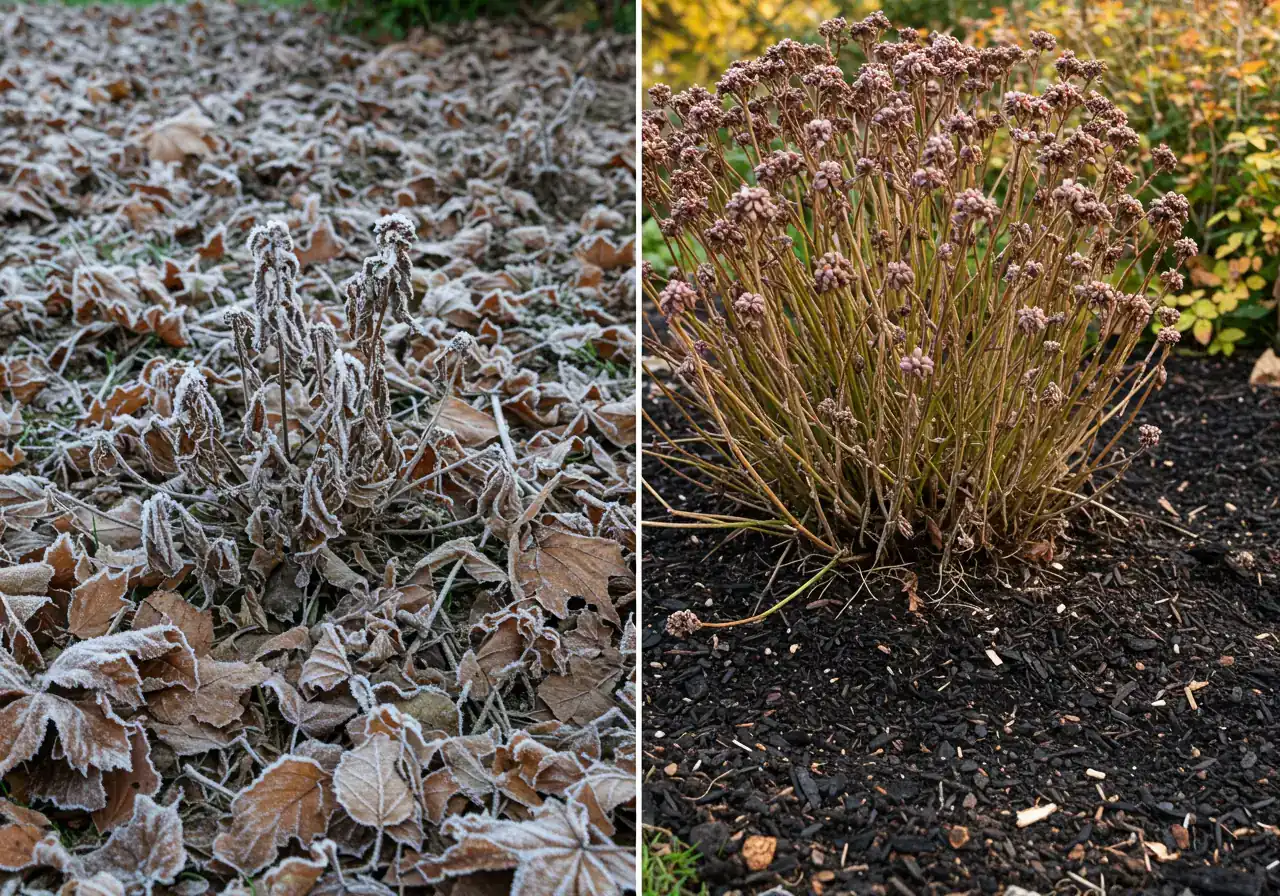
So, the leaves are falling, there’s a definite chill in the Ottawa air, and maybe you’re thinking, “Can’t I just leave it all ’til spring?” While hibernation sounds tempting (for us and the garden), putting in a little effort now pays off big time later. It’s not just about curb appeal in neighbourhoods like Greely or Barrhaven; it’s about smart gardening based on how plants actually work. Learn more about our local services on our Google Business Profile.
As the days get shorter and colder, your perennials and shrubs aren’t dying – they’re going dormant. Like bears preparing for winter, they stop putting energy into leaves and flowers and pull all those valuable resources down into their roots. This is crucial for plant survival through our sometimes brutal winters. Giving them a helping hand during this transition makes a world of difference.
Here’s the science-y bit, made simple:
- Pest & Disease Pow-Wow Prevention: That pile of dead leaves and spent flower stalks looks like a 5-star hotel to unwanted guests. Slugs, fungal spores, and insect eggs love to overwinter in garden debris. Cleaning it up now means fewer problems next spring. Removing diseased plant matter is especially key to prevent issues from spreading – nobody wants a repeat performance from pests like destructive Japanese Beetles, so learning about is a smart move for prevention.
- Root Pampering: Our Ottawa winters often feature annoying freeze-thaw cycles. A good layer of mulch (like shredded leaves or straw) acts like a cozy blanket for plant roots, keeping the soil temperature more stable and preventing frost heave (which is when plants literally get pushed out of the ground – rude!). Covering bare soil also helps reduce winter washouts; check out these for more ideas on protecting your soil. Proper soil preparation is key.
- Building Strength for Spring: While plants are slowing down up top, roots can still grow a bit in cool soil. Fall is a great time to improve soil health by adding compost. For your lawn, applying fall fertilizer or considering helps establish strong roots before the ground freezes solid. Similarly, strategic pruning removes weak or damaged branches that could snap under heavy snow or ice – knowing about can save you headaches later.
- A Better Spring Show: Healthy roots + protected crowns + fewer overwintering pests = plants that wake up happy and ready to grow vigorously next spring. You’ll be rewarded with stronger growth, more blooms, and healthier shrubs.
So, fall garden TLC isn’t just busywork. It’s essential preventative landscaping maintenance that sets your garden up for success. It helps your plants survive the winter strong and bounce back beautifully when the warmth returns. If the task list feels a bit daunting, remember there are always professional Landscaping and Yard Care Services available to help tuck your garden in properly. Think of it as investing in next year’s beauty, today!
The Great Fall Clean-Up: Tidying Up Your Embrun Yard Like a Pro
Alright, Embrun neighbours, the leaves are doing their spectacular fiery dance, and it’s time for the main event: The Great Fall Clean-Up! Don’t worry, it’s not as daunting as it sounds. Think of it as giving your yard a final spa treatment before its long winter nap. Let’s break down the essential gardening tasks to tackle your yard like a pro, whether you have a cozy lot downtown or a sprawling space out near Manotick.
1. Conquer the Leaf Kingdom:
Yes, raking. It’s the quintessential fall chore! Leaving thick layers of leaves on your lawn can suffocate the grass and promote snow mold.
- Eco-Tip: Got healthy leaves (no obvious spots or diseases)? Don’t trash them! Shred them with a mower and add them to your compost pile or use them as mulch around perennials and shrubs. They break down into fantastic food for your soil. Check with the City of Ottawa Waste Explorer for disposal guidelines.
- Caution: If you had powdery mildew on your phlox or black spot on roses, bag those specific leaves up for yard waste pickup. Don’t compost diseased material – that’s just asking for trouble next year!
- Big Yard Blues? If you’re feeling buried in leaves, especially on larger properties, remember professional help is available. For instance, a reliable Kenmore Property Cleanup Service can make quick work of leaf mountains. Or consider options like our Marionville Property Cleanup Service.
2. Perennial Pruning Ponderings:
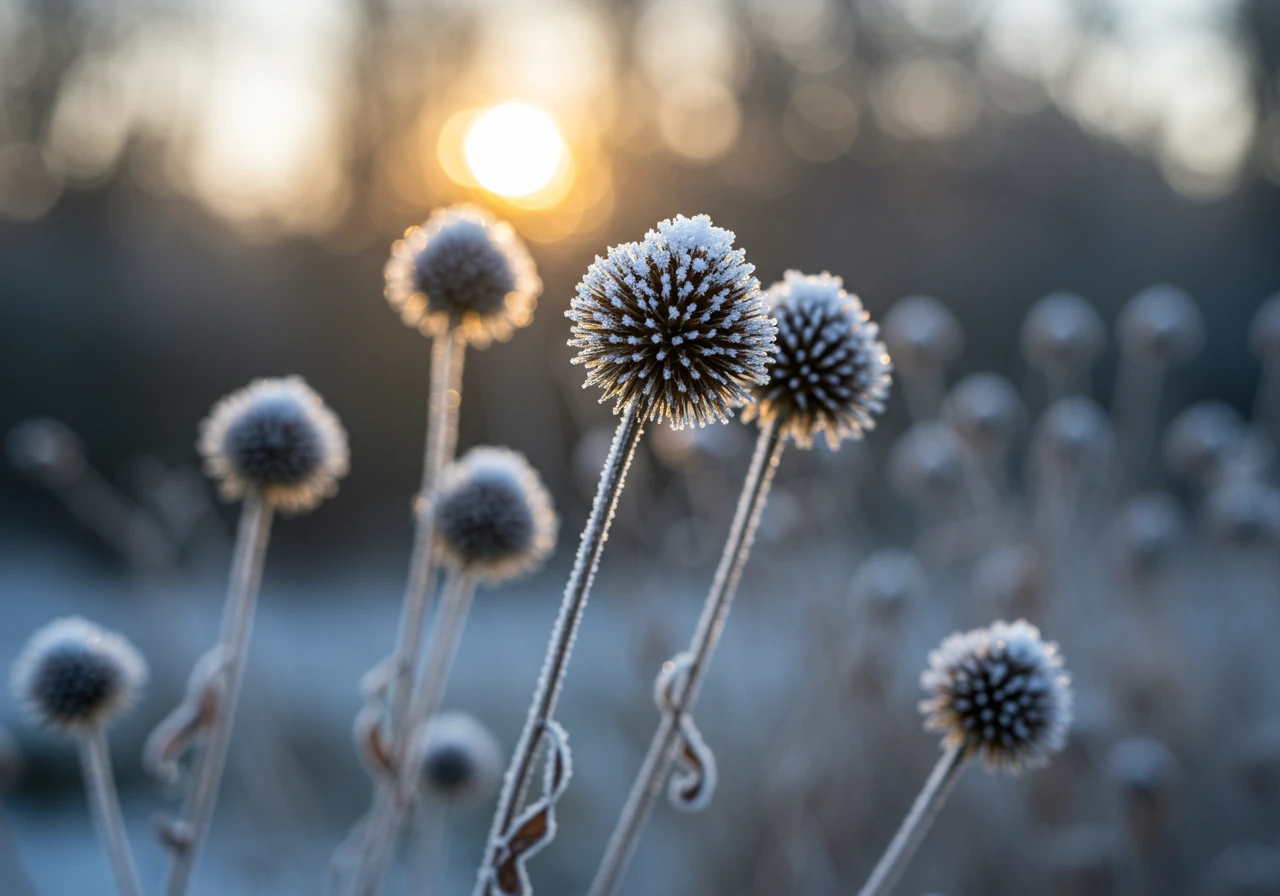
To cut back or not to cut back? That is the question for your perennials. Here’s a quick guide:
Cut Back Now:
- Why: Tidy appearance, disease prevention (especially for plants prone to fungal issues like peonies, hostas, or daylilies). Makes spring cleanup easier.
- Examples: Hostas, Peonies, Daylilies, Irises (cut foliage back after frost).
Leave Standing:
- Why: Provides winter interest (think ornamental grasses swaying in the snow!), offers habitat and food for birds, helps catch insulating snow.
- Examples: Coneflowers (Echinacea), Sedum (‘Autumn Joy’), Ornamental Grasses, Black-Eyed Susans (Rudbeckia). Get advice from local experts like the Master Gardeners of Ottawa-Carleton.
Pro Tip: When in doubt, research the specific plant or observe what experienced gardeners in areas like nearby Marionville do. If tackling extensive garden beds feels overwhelming, consider looking into a Marionville Garden Clean Up Service to handle the detailed perennial care. Comprehensive Garden Maintenance plans can cover this.
3. Tidy Up Garden Beds:
Pull out spent annuals (frost-bitten petunias aren’t coming back, sadly!). Yank any lingering weeds – they’ll just spread seeds otherwise. Gently loosen the top layer of soil if needed. This is the perfect time to apply a protective layer of winter mulch. Applying fresh mulch and creating crisp borders not only looks sharp but insulates roots. Learn more about the benefits of Mulching and Edging.
4. Final Lawn Love:
Give your lawn one last mow, cutting it slightly shorter than usual (around 2.5 inches) to discourage pests and disease over winter. Bagging the clippings for this final cut is often a good idea, especially if you have lingering leaves. Ensuring your whole property is winter-ready is key, and comprehensive help is available through services like an Ottawa Yard Cleanup Service.
5. Tool Time & Debris Duty:
Clean your shovels, pruners, and mower. A little oil prevents rust. Store hoses indoors. Gather all the debris you’ve collected – leaves, dead plants, branches. Dispose of it according to municipal guidelines or consider professional removal.
Taking these steps sets your Embrun yard up for a healthy return next spring. While it takes effort, think of the head start you’ll have! And if life gets too busy, remember that a range of Landscaping and Yard Care Services are just a call away to help you wrap up the landscaping season perfectly. Happy cleaning!
Water Works: The Crucial Pre-Freeze Drink
Okay, team, let’s talk hydration! Before your garden beds turn into frozen tundra, there’s one last crucial task that often gets overlooked: giving your plants a good, long drink. Think of it as packing them a canteen for their long winter journey ahead. This pre-freeze watering is especially vital for plant survival here in the sometimes-harsh Ottawa region climate.
Why bother when rain (or eventually, snow!) is coming? Well, winter winds can be incredibly drying, especially for evergreens like cedars, pines, firs, and rhododendrons. They continue losing moisture through their needles or leaves all winter long, a process called desiccation. If their roots go into the freeze already thirsty, they can suffer serious damage or browning (winter burn) by the time spring rolls around. Newly planted trees, shrubs, and perennials, especially those put in late summer or fall in neighbourhoods like Barrhaven or Greely, haven’t had much time to establish deep roots. They really need that moisture boost to survive their first Canadian winter successfully. For information on local water conservation, check resources like the Rideau Valley Conservation Authority.
The goal isn’t just a quick splash; it’s deep hydration. Give your vulnerable plants a slow, thorough soaking right around the root zone – let the hose trickle for a good while rather than just blasting the surface. How often? If we’re having a dry fall (which happens!), aim for a deep watering perhaps once a week until the ground starts to freeze solid. This usually happens sometime in late October or early November in Ottawa, but Mother Nature always likes to keep us guessing! Keep your local soil type in mind, too. Clay-heavy soil, common in some parts of Nepean, holds water longer, while sandier soils will drain more quickly, potentially needing water more frequently during a dry spell. Remember that proper Mulching and Edging Practices applied after your fall cleanup also significantly help conserve this crucial moisture around the roots, acting like a blanket.
Getting this final watering right makes a huge difference for preventing winter damage and ensuring vigorous spring growth; you’ll be rewarded with healthier plants ready to put on a show, much like the thriving landscapes showcased in our Project Gallery. If you’re juggling too many fall gardening tasks or are unsure about the specific needs of your plants, remember that comprehensive help is available. Services like a dedicated Marionville Yard Cleanup Service can ensure your plants get all the pre-winter care they need, including that vital final drink. Trust the advice from experienced local landscaping teams like those you can learn about on our About Us Page; we understand the unique challenges and rewards of Ottawa gardening. Just as we believe in transparency in all our operations (you can always review our commitment to protecting your information in our Privacy Policy), we want to be crystal clear: don’t skip this final, vital watering step for happy, healthy plants next year!
Tuck ‘Em In: Mulching and Winter Protection Strategies
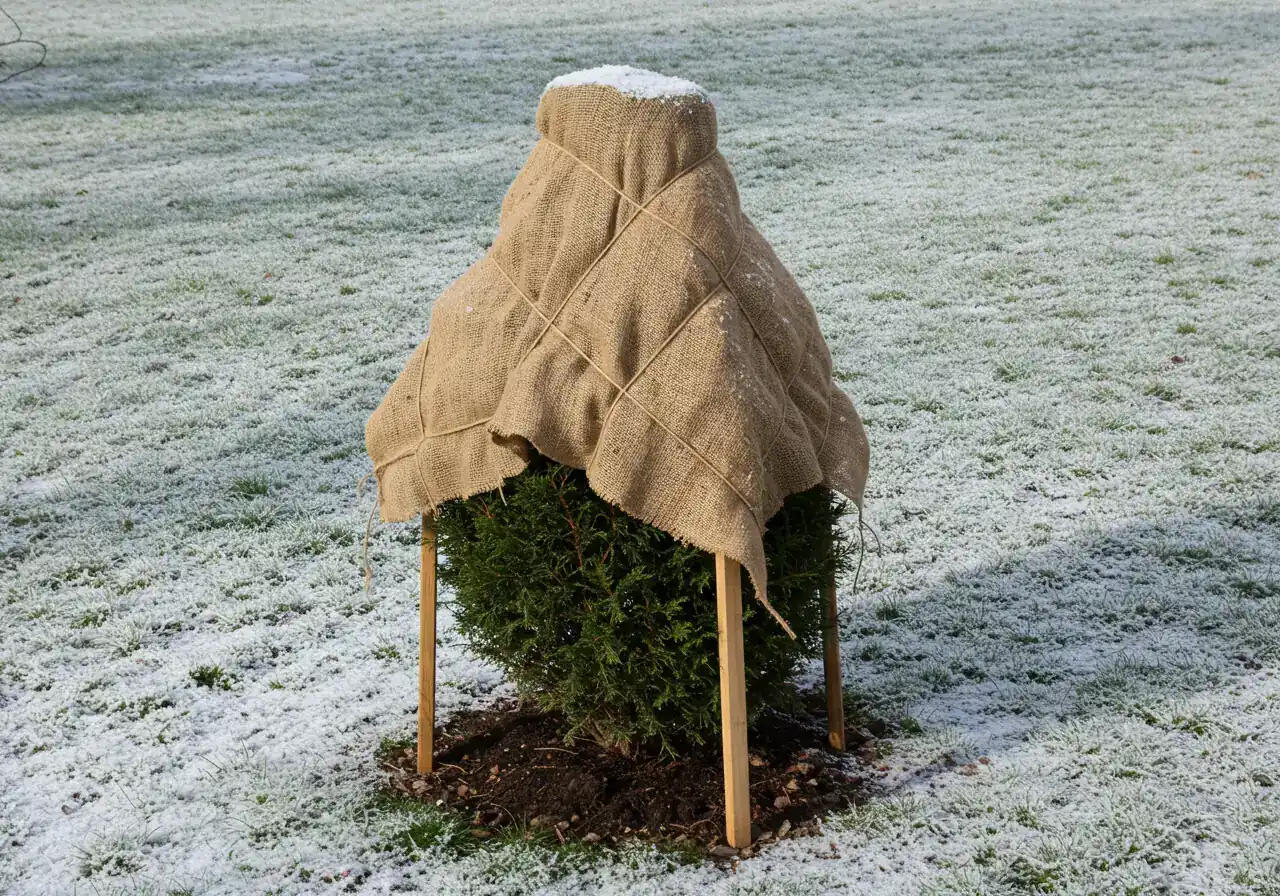
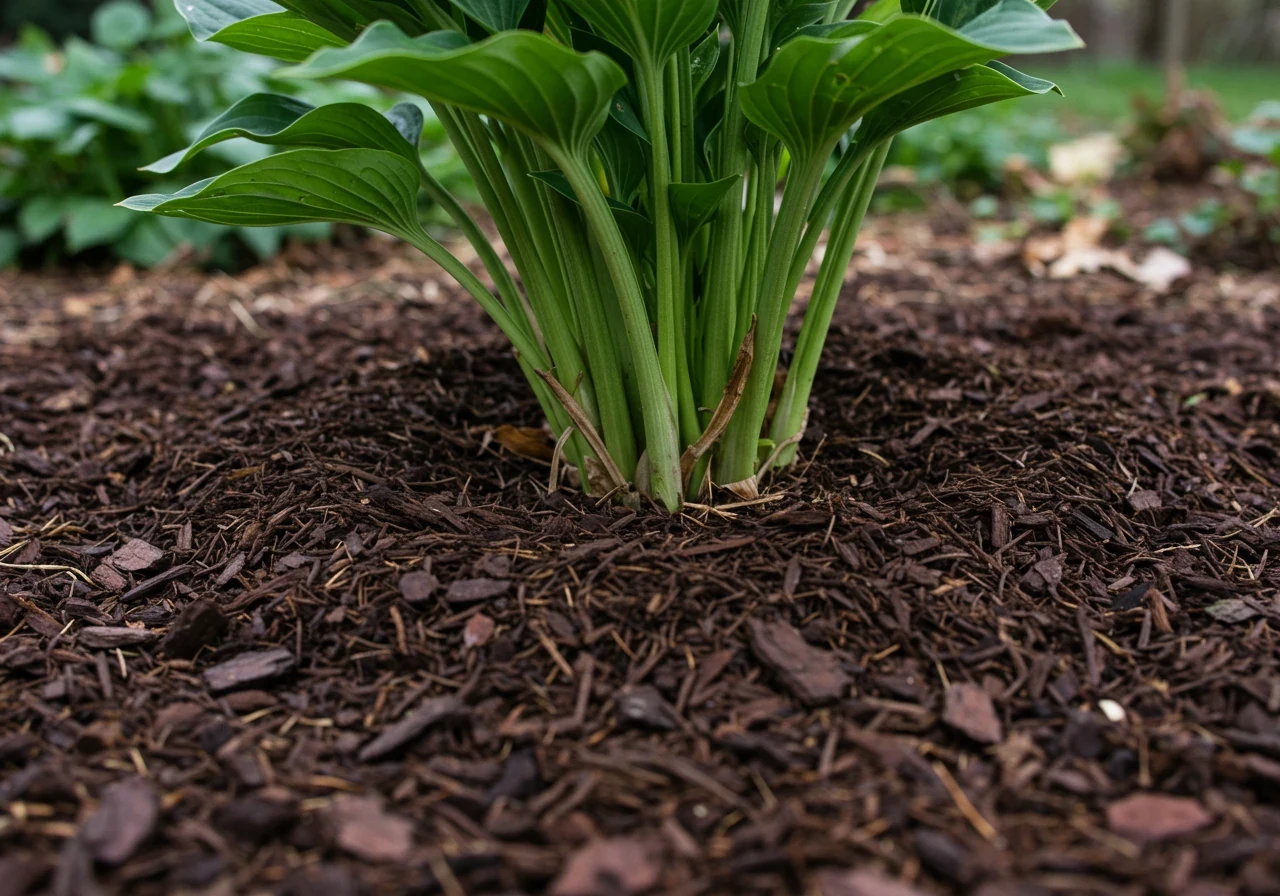
Alright, your garden beds are clean, the leaves are (mostly) conquered, and your plants have had their final big drink. Now it’s time for the coziest part of fall prep: tucking everything in snugly for the winter! Think of mulching and winter protection as providing a warm blanket and a sturdy snowsuit for your precious plants. Here in Ottawa and surrounding areas like Embrun or even out towards Greely, our winters can throw some real curveballs – biting winds, heavy snow loads, and those notorious freeze-thaw cycles. Proper protection now means happier, healthier plants come spring.
Mulch Magic: More Than Just a Pretty Blanket
Applying a layer of mulch in late fall is one of the best things you can do for your perennials and shrubs. It’s not just about looking tidy; it’s about plant survival.
- Why Mulch?
- Insulation Station: Mulch acts like a duvet for the soil, keeping the temperature more stable. This prevents the ground from repeatedly freezing and thawing, which can heave plants right out of the earth – rude!
- Moisture Minder: It helps retain that crucial moisture you provided during the final watering, preventing roots from drying out in winter winds.
- Weed Warrior (Lite): It suppresses late-season weeds and gives you a head start against early spring invaders.
- Erosion Control: Protects your precious topsoil from washing away during winter rains or snowmelt.
- How to Mulch:
- Timing is Key: Wait until after a few light frosts have kissed the ground, but before it freezes solid. Usually, late October or early November works well in our region.
- The Right Stuff: What to use? Shredded leaves (your own, if disease-free!), straw, shredded bark, or wood chips are excellent choices. Compost is great for soil health, but apply it before the insulating mulch layer. Need help choosing? See our material selection guide.
- Apply Generously (But Smartly): Aim for a layer about 2-4 inches deep. Crucial tip: Keep mulch pulled back an inch or two from the stems of shrubs and the crowns of perennials. Piling it right against the plant can trap too much moisture and invite rot or pests. Think donut, not volcano!
Beyond the Blanket: Winter Armor for Vulnerable Plants
Some plants need a bit more than just mulch to face an Ottawa winter, especially newer additions or those in exposed locations.
- Who Needs Extra Help?
- Newbies: Anything planted this year, particularly those from a late-season Garden Installation, hasn’t fully established its roots.
- Tender Roses: Many hybrid tea roses need protection.
- Broadleaf Evergreens: Plants like Rhododendrons, Boxwoods, and some Hollies can suffer from windburn and sunscald.
- Roadside Warriors: Plants near driveways or roads (a common sight in expanding areas like Barrhaven) are vulnerable to damaging salt spray.
- Young Trees: Thin bark is susceptible to sunscald and nibbling critters.
- Protection Methods:
- Burlap Wraps: For shrubs prone to windburn or snow damage (like upright cedars), create a screen. Drive stakes around the plant and wrap burlap around the stakes, leaving the top open for air circulation. Don’t wrap burlap tightly directly against the foliage, as this can trap moisture. This simple barrier deflects wind and prevents heavy snow from splaying branches.
- Tree Guards: Protect young tree trunks from rabbits and mice (who find bark delicious in winter!) and prevent sunscald (winter sun reflecting off snow can bake the bark). Wrap the lower trunk with plastic tree guards or hardware cloth, ensuring it goes below the expected snow line but doesn’t constrict the trunk.
- Rose Collars/Cones: Place a rose cone or create a collar of hardware cloth around the base of tender roses after the ground begins to freeze. Fill loosely with straw or shredded leaves for insulation.
Taking these steps might seem like extra work, but you’re essentially investing in next spring’s beauty. Protecting your plants now saves you heartache (and replacement costs!) later. If tackling burlap wrapping or sourcing the right materials feels overwhelming, remember that professional help is available. A full Ottawa Property Cleanup Service often incorporates these crucial winter protection measures. Have questions about a specific plant’s needs or want to discuss getting your garden tucked in professionally? Please Contact Us. We’re always happy to help ensure your landscape investment is protected, and we handle all inquiries with care for your privacy, as outlined in our Privacy Policy. You can also review the specifics of our service agreements in our Terms and Conditions. Sweet dreams to your garden!
Fall Garden Care Timeline
Early Fall (Sept-Early Oct)
Clean up spent annuals & diseased foliage. Divide crowded perennials. Consider . Start major cleanups like Metcalf Yard Cleanup Service.
Mid-Fall (October)
Plant spring bulbs & garlic. Rake leaves regularly. Give lawn final shorter mow. Perform crucial .
Late Fall (Late Oct-Nov)
Provide final deep watering before freeze-up. Apply winter mulch after light frosts. Install winter protection (burlap, tree guards). Clean & store tools. Book your free estimate for spring projects.
Winter (Dec-Mar)
Monitor plants for heavy snow load. Plan next year’s garden (garden installs?). Check Customer Portal for service history.
Bonus Round: Fall Planting and Soil Love
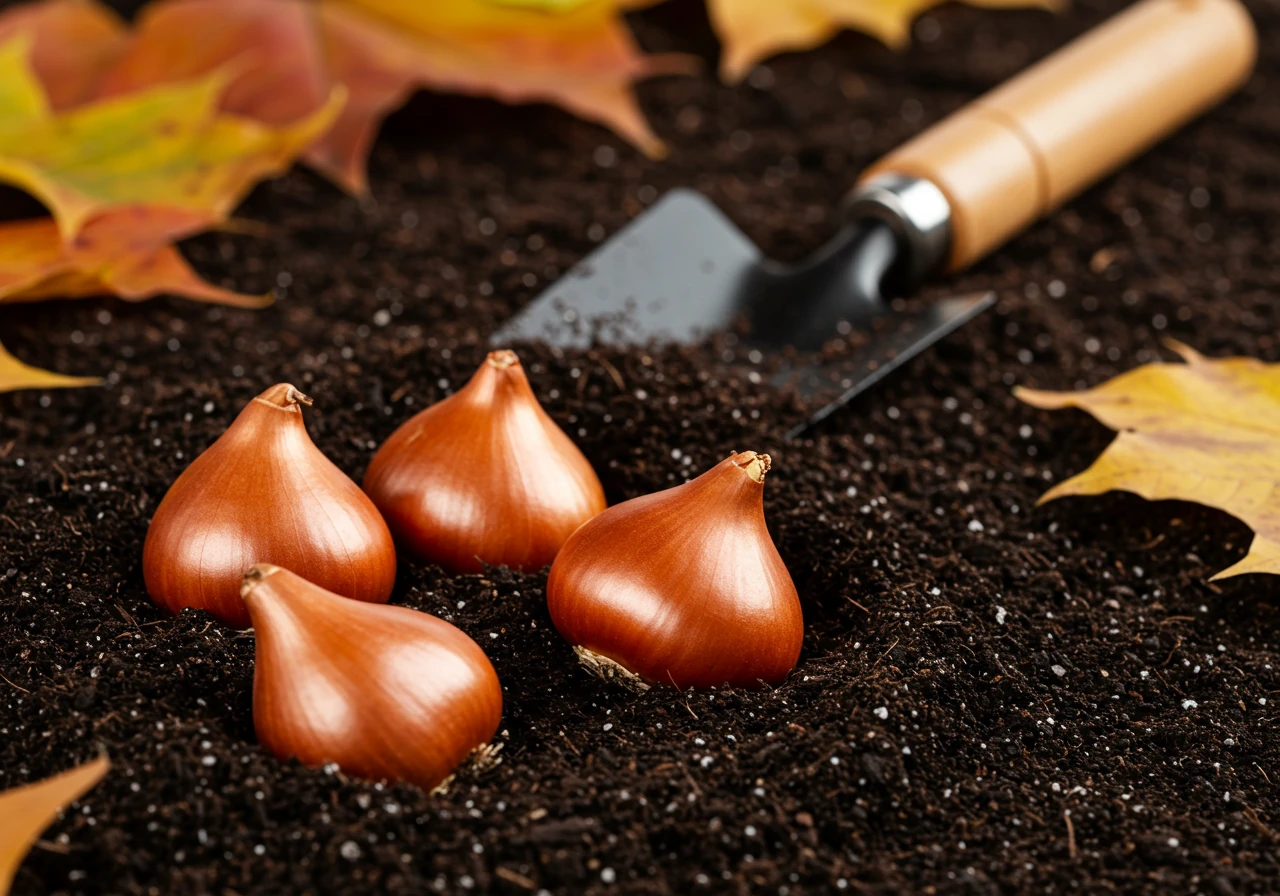
Think the gardening fun is over just because the pumpkins are out? Think again! Fall in Ottawa offers a fantastic bonus round for getting a jump on next spring and giving your soil some much-needed TLC. While your neighbours are busy raking, you can be planting future beauty!
Planting Power:
Fall is prime time for planting spring-blooming bulbs. Think tulips, daffodils, hyacinths, crocus, and alliums. Planting them now allows their roots to establish before the ground freezes solid, setting them up for a spectacular show come springtime. Just imagine those pops of colour after a long winter – worth the effort now, right? And don’t forget garlic! Planting garlic cloves in the fall yields bigger, better bulbs next summer. Aim to get bulbs and garlic in the ground about 6 weeks before the ground typically freezes – usually by mid-to-late October around here. You can also plant some super hardy perennials in early fall, giving them a chance to settle in. Just make sure your planting beds are clear of debris first; if you’re looking at a major leaf situation or old plant matter, getting help from Ottawa Property Clean Up Services can clear the way.
Soil Sweeteners:
Fall is also the perfect time to show your soil some love. Why now? Because improving soil structure takes time, and the freeze-thaw cycles of winter can actually help incorporate amendments. Many areas around Ottawa, like parts of Nepean or Barrhaven, deal with heavy clay soil. While clay holds nutrients well, it can be dense and poorly draining. The solution? Compost, glorious compost! Spreading a few inches of good quality compost over your garden beds and gently working it into the top layer does wonders. It improves drainage, adds vital organic matter, feeds beneficial soil microbes, and makes clay soil much easier to work with next spring. Unsure about the best type of compost or mulch for your specific needs? Check out resources for Landscape Material Selection Guidance to make an informed choice. Improving your soil benefits everything you grow, from bulbs to veggies, and even helps if you’re considering lawn projects like Fall Sod Installation for Ottawa Homes.
Feeling inspired but maybe a bit overwhelmed by the thought of digging in compost across large beds? You can always Book a Free Landscaping Estimate to discuss soil amendment or fall planting projects. Have specific questions about what bulbs do best in our climate or need advice tailored to your yard? Feel free to Contact Our Gardening Experts. Investing a little time in fall planting and soil love now really pays off with a healthier, more vibrant garden next year!
*Relative impact estimates for illustrative purposes.
Embrun Fall Care Cheat Sheet: Key Takeaways
Feeling a bit overwhelmed by the fall gardening to-do list? Don’t worry, we’ve got your back! Here’s a quick rundown of the absolute must-do tasks to get your Embrun yard ready for its winter slumber and set it up for success next spring. Think of this as your cheat sheet for happy plants!
- Tidy Up & Protect: Rake those leaves off your lawn (smothered grass is sad grass!) and clean up spent annuals and weeds from garden beds. Cut back perennials prone to disease (like hostas or peonies) after a frost, but consider leaving sturdy plants like ornamental grasses or coneflowers standing for winter interest and bird food. Removing debris helps prevent pests and diseases from setting up a winter camp.
- Last Call for Watering: Before the ground freezes solid here in the Ottawa area, give your trees, shrubs (especially evergreens like cedars and pines!), and perennials a good, deep soaking around their roots. Winter wind can be very drying, and this final drink helps prevent dehydration and winter burn, particularly for plants installed this year.
- Mulch Like You Mean It: Once the ground has cooled down (usually late October/early November), apply a 2-4 inch layer of insulating mulch (like shredded leaves or bark chips) over your garden beds. Crucial tip: Keep the mulch pulled back slightly from plant stems and crowns (think donut, not volcano!) to prevent rot. This cozy blanket protects roots from harsh freeze-thaw cycles and conserves soil moisture.
- Winter Armor for the Vulnerable: Some plants need extra TLC. Wrap upright evergreens or shrubs susceptible to snow damage loosely with burlap (use stakes to create a screen). Protect the trunks of young trees from critters and sunscald with plastic tree guards. If you have plants near driveways or roads, especially in areas like nearby Metcalfe, consider burlap screens to shield them from salt spray. Dealing with winter damage might make you consider options like a New Lawn Installation Using Sod come springtime.
- Plan & Get Help if Needed: Tucking your garden in properly now makes spring landscaping so much easier! If the task list looks daunting, remember professional help is always an option. You can conveniently manage your appointments or look up past services through our Client Service Portal. Planning a major overhaul next year? Perhaps something like a Metcalf Property Cleanup Service? Fall is a great time to think ahead. We value your input, so if you’ve recently interacted with us, please consider leaving Feedback on Your Estimate Process.
Frequently Asked Questions (FAQs) for Ottawa Gardeners
That’s a great question! Ideally, you want bulbs and hardy perennials in the ground about 6 weeks before the ground freezes solid. Around Ottawa, think mid-to-late October as a safe bet. This gives roots time to establish before winter truly hits. Planting later, say in mid-November, is risky. The ground might freeze before roots grow, potentially leading to frost heave (plants popping out!) or poor survival. While we sometimes get mild Novembers, especially further south near Winchester, it’s best not to gamble too much. Prioritize getting those spring beauties tucked in before Halloween if possible!
Oh, the infamous Ottawa clay – we know it well, especially in areas like Nepean! Don’t despair, fall is the perfect time for improvement. The absolute best thing is adding lots of organic matter. Spread a generous layer (2-4 inches) of good quality compost over your beds after cleaning them up. You can gently work it into the top few inches. Winter’s freeze-thaw cycles will actually help mix it in further! This improves drainage, adds nutrients, and makes the soil easier to work next spring. Avoid adding sand, which can sometimes make clay even harder. Proper soil amending makes all subsequent gardening much easier.
Ugh, hungry critters are the bane of many gardeners! Rabbits, deer, and voles can be a nuisance, especially when snow covers their usual food sources. Physical barriers are often your best bet. Use plastic tree guards around young tree trunks and wire mesh (hardware cloth) cylinders around vulnerable shrubs or bulb plantings. Make sure the mesh is fine enough to block rabbits and buried slightly to deter voles. Keeping the garden tidy also helps – removing brush piles eliminates hiding spots. If critter patrol feels overwhelming, a thorough Ottawa Garden Clean Up Service can help reduce potential winter habitats for pests.
Your lawn definitely appreciates some fall TLC after working hard all summer! The single most beneficial step is usually applying a fall fertilizer. Look for one formulated for fall application – it’s typically higher in potassium to promote strong root growth over winter, which is key for a healthy start next spring. Keep mowing until the grass stops growing, lowering the blade slightly for the final cut (around 2.5 inches). And definitely keep raking those leaves off the lawn! A thick leaf layer can smother the grass and invite disease. Consistent Lawn Care in the fall sets the stage for a lush green carpet next year.
One common slip-up we see is not cleaning up diseased plant material thoroughly. It’s tempting to just rake everything into a pile, but if you had issues like powdery mildew on phlox, black spot on roses, or blight on tomatoes, leaving that infected debris in the garden or compost pile is basically rolling out the welcome mat for the same problems next year! Bag up and dispose of clearly diseased material separately. Proper cleanup prevents overwintering pests and diseases, saving you headaches (and possibly plants!) come spring. It’s a key part of effective landscaping maintenance, like that offered by our Marionville Garden Clean Up Service.
It definitely can be a lot, especially with larger properties or busy schedules! Getting professional help can be totally worth it. Pros have the right tools, know-how for tasks like tricky pruning or proper mulching, and can dispose of all the yard waste efficiently. You should expect clear communication about the services included – leaf removal, perennial cutbacks, bed cleanup, maybe even winter protection application. For specialized needs in specific areas, like a Metcalf Garden Clean Up Service, you get targeted expertise. Ultimately, it saves you time and ensures the job is done right, setting your garden up beautifully for spring. We always appreciate hearing from satisfied clients via our Thank You page after a job well done!
Conclusion: Set Your Embrun Garden Up for Spring Success!
Phew! We’ve covered a lot of ground, haven’t we? From battling leaf piles like a seasoned warrior to tucking your precious perennials in with a cozy mulch blanket, preparing your Embrun garden for winter is more than just a final chore – it’s your secret weapon for an amazing spring showcase! Think of all this fall gardening effort as giving your plants a VIP pass to thrive, ensuring they burst back to life vibrant and healthy, ready to impress everyone from here to nearby Russell. You’re actively preventing pests, protecting vulnerable roots from our Ottawa winter antics, and basically ensuring your yard wakes up happy next year.
While the temptation to just sip cocoa and watch the snow fall is strong (we totally get it!), putting in this landscaping groundwork now pays off exponentially later. But hey, we also know life gets busy! If your to-do list is overflowing or those rakes are mocking you, don’t let your garden miss out on essential care. Let the pros handle the heavy lifting and expert details.
- Book Your Free Estimate: Get a no-obligation quote specifically for fall cleanup, protective mulching, or winter wrapping tailored to your yard. Visit us at cleanyards.ca/book-estimate/.
- Ask the Experts: Have questions about specific plants, soil needs, or our range of fall landscaping services? Contact our friendly team today.
- Explore Fall Services: See exactly how we can help prepare your garden for winter by checking out our fall care options online at cleanyards.ca/services/.
Let’s work together to tuck your Embrun garden in properly, ensuring it’s rested, protected, and ready for a spectacular spring!

